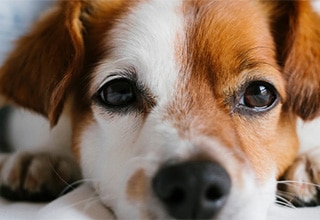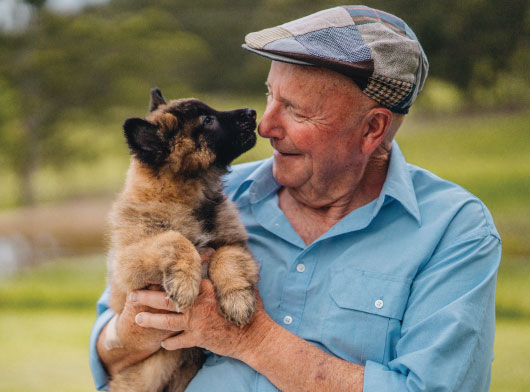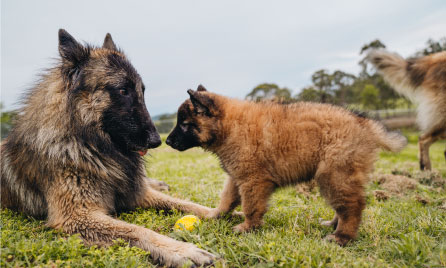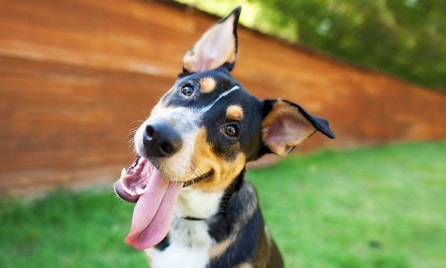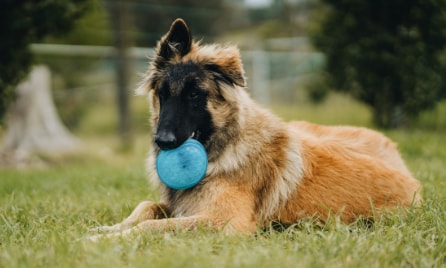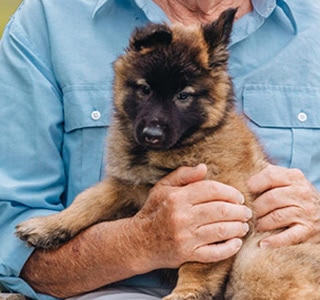- text
-
# Depending on your level of cover. Policy T&Cs, limits, exclusions, waiting periods and annual excess may apply.
Dr Harry: The evolving role of the dog.
Like many animals, dogs began as a wild species that hunted for their food and survived off the land. In fact, the ancestral dog is most genetically similar to the grey wolf. There is evidence that dogs and humans have worked together for well over 15,000 years and certainly dogs were an important part of the hunter gatherer society 10,000 years ago. Just as humans have evolved, so too have dogs - with most modern breeds being developed over the last 700 years.
Although initially self sufficient, the domestication of dogs made them more reliant on their owners. At the same time, many owners developed their dogs as either companions or for special purposes such as guard dogs, herding dogs or for ornamental purposes. The idea of ‘man’s best friend’ was born and the bond was forged. While there are many differences between a pet dog and a ‘working dog’, there are also many similarities. They both need food, water, housing, training, entertainment and social interaction.
There are numerous types of working dogs, some have been around for quite some time and most have been selected to do specific jobs. Perhaps the most traditional dog ‘occupation’ is that of the farm dog. These dogs are trained from an early age to round up livestock, jump off and on work vehicles, and lead an active and engaging life. Sheep dogs, like the Australian Kelpie and the Border Collie, are great for this sort of thing as they readily learn to muster with appropriate training.
Dogs perform many other lines of work. Therapy dogs are another type of assistance dog, and help their owners who are recovering from a debilitating injury or dealing with an acute illness. Seeing eye/guide dogs function as a set of eyes for their visually impaired owners. Guide dogs are often Retrievers (Labrador or Golden Retriever).
Many other types of working dogs are utilised for their incredible sense of smell. A dog’s sense of smell is 1,000 times more sensitive than that of a human’s. This makes dogs a great asset to our forces when detecting narcotics, explosives, flora and fauna, and even humans. Dogs can be trained for specific purposes and many ‘detection dogs’ such as Springer Spaniels have been selected to focus on one highly specific smell.
For example, St Bernards are renowned for their ability to find people in the snow. Likewise, Beagles are commonly used in quarantine spaces (such as airports) as they are less confronting. Breeds such as Malanois, Belgian and German Shepherds are commonly used to form the Police ‘dog squad’. These breeds are trained to focus on specific areas of police work and perform various duties such as discovering narcotics and tracking a criminal’s scent from a crime scene.
Regardless of whether a dog is fetching a newspaper or herding livestock, it is clear that dogs are an important part of our society and our family make-up. For children in particular, owning a dog teaches responsibility. There is also an abundance of scientific evidence to support the idea that children who have grown up with pets grow up to be far more successful in life. Even for an adult, simply spending 10 minutes a day stroking your pet is clinically proven to reduce blood pressure.
Visit Everyday Pet Insurance today and discover the different levels of cover available to help protect your dog from the unexpected.
Why pick Everyday Pet Insurance?
Get a quote online today with Everyday Pet Insurance.
Related articles.
- text
-
= The gap is defined as the difference between the vet's invoice and the claim benefit under your policy. Policy terms and conditions apply. GapOnly® is only available at participating Vets. Please visit GapOnly® to search for GapOnly® enabled vets. GapOnly® is a trademark owned by PetSure (Australia) Pty Ltd (PetSure) (ABN 95 075 949 923, AFSL 420183).
- text
-
>> Once all required claims documentation has been received.
~ Based on PetSure data February 2023 to January 2024.
- text
-
Everyday Pet Insurance policies entered into for the first time prior to 17 July 2023 and subsequent renewals of those policies are issued by The Hollard Insurance Company Pty Ltd ABN 78 090 584 473, AFSL 241436 (Hollard), arranged and administered by PetSure (Australia) Pty Ltd ABN 95 075 949 923, AFSL 420183 (PetSure) and promoted and distributed by Hollard’s Authorised Representative (AR) Woolworths Group Limited ABN 88 000 014 675, AR 245476 (Woolworths).
Everyday Pet Insurance policies entered into for the first time on or after 17 July 2023 and subsequent renewals of those policies are issued by PetSure and promoted and distributed by PetSure’s AR, Woolworths.Dr Harry Cooper (AR No.1000933) is an AR of PetSure and promotes Everyday Pet Insurance policies.
Any advice provided is general only and does not take into account your individual objectives, financial situation or needs. Please consider the Product Disclosure Statement (PDS) to ensure this product meets your needs before purchasing, or choosing to continue with the product. PDS and Target Market Determination available at insurance.everyday.com.au/pet-insurance.
